|
People sometimes wonder if we are a Christian school because we have the word "community" in our name. We are a Christian school with a heart devoted to serving others. From the early on, we have sought ways to be a part of the local community and last year we launched our Lake Marion Nursing Home service project. Since we did not want our friends to feel abandoned over the summer, Ms. Angie, Maci (our service puppy), and a small group of kids continued to visit every week. We have also participated in the egg incubator project run by our local Clemson University Cooperative Extension Service office. After Mary Margaret McCaskill, the 4-H agent, got to know our school, she realized that Harvest and 4-H are a perfect match. This organization will come alongside Harvest and offer our students even more opportunities to serve the community! 4-H Community Club
4-H In-School Programming
Parent VolunteersIf you are interested in becoming a Certified 4-H Volunteer, please let us know!
For more information, contact: Mary Margaret McCaskill (803) 435-8429
0 Comments
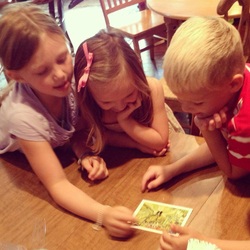 At first glance, one might think these children are simply looking at a picture. They are doing far more! In fact, they are undergoing the same training as medical school students to sharpen their habit of attention. Students at Yale head to the museum and analyze detailed paintings of the Victorian era to assess the medical conditions of the subjects. How does such a simple task build attention? Looking at something carefully rewards the viewer with a new discovery. When our primary students studied several self-portraits by van Gogh, they noticed that he did not blend his colors so that his hair and beard had strokes of red, orange, yellow, green, and blue in it. The class dubbed him "Rainbow man." One student criticized him for his "sloppy" brushwork and had a change of heart when the teacher backed up. From the blobs, dashes, and squiggles emerged a person that came alive in brilliant colors. The children begged the teacher to walk forward slowly and then backwards several times so they could see the magic happen! 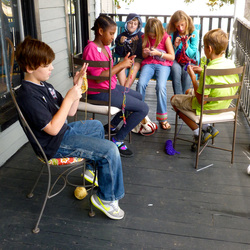 We practice the habit of attention in things we do with our hands (drawing, copywork, sewing, and finger knitting). We focus with our ears in listening to a teacher or a friend's narration and in learning the words of the songs like Great Is Thy Faithfulness, Sandlappers, El chocolate, and Dos manitas. We pay attention with our eyes when reading a book; looking for math patterns; studying the spelling, punctuation, grammar, and capitalization in our sentences for dictation; and observing nature. Whether we are working or playing, we practice attention. Before we leave the lunch table or the classroom for the day, we look around to see what needs a bit of cleaning. 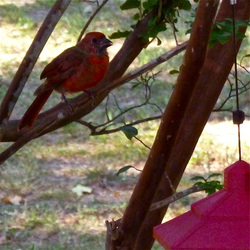 When attention wanders, the teachers guide it back to the lesson. During Spanish today, the children noticed blue jays and cardinals at the feeders. Our feathered friends completely distracted the class. So, the teacher practiced familiar phrases, el pájaro rojo and el pájaro azul, by introducing three new ones, come las semillas: the red bird eats the seeds and the blue bird eats the seeds. The reward for attention is making new discoveries. When the teacher introduced plural adjectives like dos pájaros rojos, a primary student noticed the s sounds at the end of each word. Recalling the Shakespeare play he studied last year, he remarked, "That is like how Caesar talks." With delight, the teacher shared that Caesar spoke Latin and Spanish came from Latin. 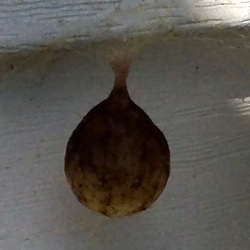 Attention to nature is a habit teachers and students are cultivating. We are collecting still objects like bark, leaves, nests, snake skins, and feathers. Children catch insects to show to friends at recess. Lately, they have been bringing from home grasshoppers, a praying mantis, and a spider rescued from death by drowning in a swimming pool. Today, the primary class enjoyed a special treat: they took their nature notebooks on a short field trip. There, they watched a banana spider prepare a grasshopper for lunch. They had to pay careful attention for the task took less than a minute! The students also studied the spider's egg sac. 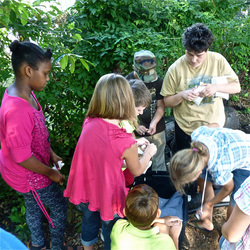 The elementary class is also working on their attention. They built a water filter for the pond and developed different solutions to its slow drainage problem. Over the weekend, the headmaster and her family troubleshooted the issue. Monday at recess, the students ran to the water filter, delighted that it was finally working, and studied the modifications. During science, they recorded their observations in their notebooks. At the beginning, the class found history narrations a challenge. Most students could only remember one fact or idea from the reading and drew a blank a day later. They asked for tips, and their teacher saw a pattern in their narrations: the students paid attention to one thing to narrate and relaxed for the rest of the passage. Once they learned to concentrate from beginning to end and then narrate from beginning to end, their memory improved. In fact, they read four different books, only on Fridays. Every week, they can recall the reading from the week before! Learning to marshal the powers of attention is not easy at first. After a month of school, the elementary class and their teacher had a conversation about this habit. They concluded, "The habit of attention changes who you are. It changes how you see the world." Charlotte Mason could not have said it better! At Harvest Community School, we are working hard to prepare our students for college and for life. College preparation is not limited exclusively to academics because other indicators lead to success. We all know highly educated, intelligent people who have shipwrecked their lives because they lacked character and spiritual maturity. This is why we read living books filled with rich stories and engaging characters. While our students are studying important historical events and scientific concepts that they need academically, they are also learning from the life experiences of characters in their books, whether real or fictional. Writing, discussing, and researching about what they are learning is college preparation. Another major benefit of reading living books instead of textbooks is its effect on character. The lives of people illustrate that good, or bad, decisions lead to good, or bad, consequences. Thus, our students are thinking, writing, discussing, and even praying about these character lessons. Our focus on faith develops character as well. Our students are reading The Living Book--The Bible, learning hymns, reading stories of faith, and experiencing firsthand the awe and wonder of God in nature. This is college preparation--the college preparation I wish I had had. As we were walking the trail at Santee National Wildlife Refuge last Friday, I began to consider how I prepared for college. I was ready academically, and I knew right from wrong, but I lacked spiritual maturity. What little faith I had was not strong enough to stand against the forces encountered in class. During my first semester at the College of Charleston, a professor of religion walked into the class and said, “If you were brought up in the church, this class is going to break your heart.” He then began to assault the inerrancy of the Bible--an assault delivered by someone with intellectual authority. A college professor standing before me--looking every bit the part of an intellectual in his round spectacles and tweed coat with patches on the elbows--pointed out all the inconsistencies in the Gospels. He then assigned Bibles readings to highlight them even more. I am ashamed to say that, at the end of the semester, I sold that Bible back to the college bookstore because this professor had convinced me that it was merely a book holding nothing of value for me. I want Harvest Community School to prepare children for this. I want our students on the Dean’s List. I want our students making good decisions in hard situations. I want our students to be able to stand in front of a professor like the one I had and say, “You will not break my heart.” I want them to come to college with a dog-eared, well-worn, well-read, inerrant and infallible Bible, and not have to buy one from the college bookstore. I want them to be able to defend their faith. This is college preparation I wish I had had. It may seem strange that all of this came to mind while I was hiking in the woods. However, Paul writes and God says in Romans 1:19-20, “For what can be known about God is plain to them, because God has shown it to them. For his invisible attributes, namely, his eternal power and divine nature, have been clearly perceived, ever since the creation of the world, in the things that have been made.” God is radically present in nature! So it comes as no surprise that he would create in nature a powerful defense against the alleged inconsistencies in the Gospels. The Gospels are eyewitness accounts. Matthew, Mark, Luke, and John--under the inspiration of the Holy Spirit--shared the good news of Jesus Christ. While they do not all tell the same exact facts, they do all tell the same story. We can trust their memories because Jesus says in John 14:25-26, “These things I have spoken to you while I am still with you. But the Helper, the Holy Spirit, whom the Father will send in my name, he will teach you all things and bring to remembrance all that I have said to you.” I just love how God provided a beautiful illustration of this for us on the trail last week. We broke up into small groups and staggered our hiking times so that there would be a good deal of space between the groups. I had a delightful time with my group. We saw a sapling covered with tent caterpillars, found a large inchworm, “fished” for a chicken choker (tiger beetle larvae), caught frogs and snails, and were awed by some impressive spider webs. As we ran into each other along the trail, each group would excitedly tell us about the things they had seen. One group had seen a snake skeleton. In another group, a girl had taken some beautiful pictures of flowers she had found in a field. Other groups were excited by some of the insects they had seen and others enjoyed pulling water hyacinth out the water, tearing it open and being awed by “God’s styrofoam.” It occurred to me then that it was not necessary for us to have all seen and experienced the same thing to make our observations true and reliable. The fact that my group didn’t see the snake skeleton didn’t mean their story was false. In fact, over lunch, as we each told about our unique experiences during the walk, a clearer, more vivid picture of the trail came into focus. The same is true for the Gospels. Matthew, Mark, Luke, and John did not all have to describe the same things to make the story true. It is valid that they each had their own observations. In fact, as the Holy Spirit brought varied events and circumstances into the Gospel writers' minds, He was offering a clearer and more vivid picture for us. What a blessed people we are! We have a God who wants us to know him. We have a God who has provided for us His perfect Word, so that that the story of His love can come into a clear and vivid focus for His children. God wants to prepare us for far more than college. The Bible says in 1 Peter 1:13-16, “Therefore, preparing your minds for action, and being sober-minded, set your hope fully on the grace that will be brought to you at the revelation of Jesus Christ. As obedient children, do not be conformed to the passions of your former ignorance, but as he who called you is holy, you also be holy in your conduct, since it is written, ‘You shall be holy, for I am holy.’" ~Shea Failmezger Click here for a first hand account of how a Charlotte Mason education prepared one young man for college.
|
HCSA community called to offer another way to learn for students in Clarendon County Archives
December 2019
|
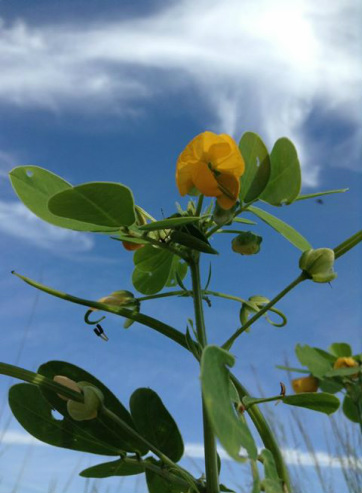
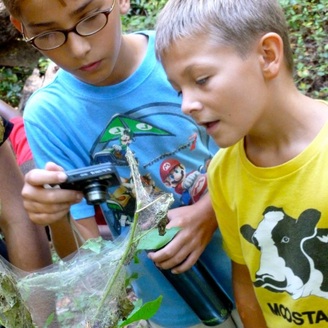
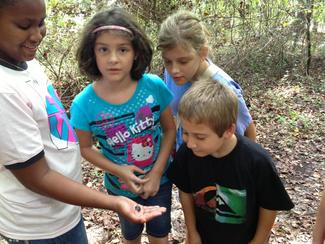
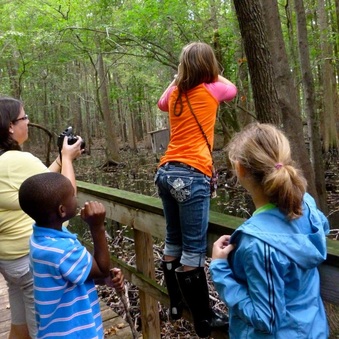
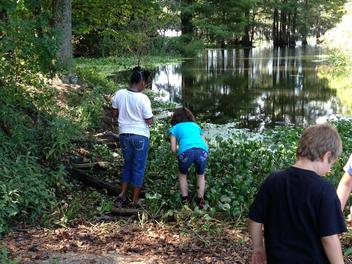
 RSS Feed
RSS Feed
